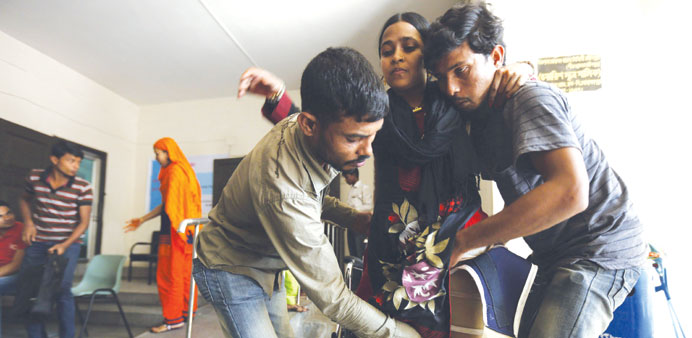|
A US Senate report has urged Walmart, Gap and other retailers to respect labour unions in Bangladesh, saying workers desperately needed greater rights after hundreds died in fires. |
The staff report from the Senate Foreign Relations Committee’s Democratic Party majority came as Bangladesh’s government and foreign retailers agreed to start safety inspections on the 3,500 factories in the world’s largest garment maker after China.
Senator Robert Menendez, the chairman of the committee, vowed to help give workers “the tools they need to protect themselves” after a factory fire in April killed 1,135 people and a similar disaster in November 2012 left 111 workers dead.
“No consumer will want to wear clothing if it’s stained by the blood of innocent workers,” Menendez said in a statement late on Friday.
Following the tragedies, more than 100 companies, mostly from Europe, entered an accord on fire safety that includes union representation.
Major US companies including Gap and Walmart, which is known for its opposition to organised labour, set up a separate initiative that also covers safety standards but does not bring in unions.
The staff report urged US companies to “launch long-term, well-resourced programmes to educate their suppliers in Bangladesh of their expectation for compliance with laws allowing the right to organise unions and bargain
collectively.”
“They should also collectively develop and implement a policy of zero-tolerance for suppliers who consistently engage in
anti-union activity,” it said.
The report called on the United States to step up funding to support workers’ rights in Bangladesh and to keep high standards as it considers lifting the South Asian country’s suspension from duty-free access for many of its exports.
Bangladeshi authorities recently cracked down on unions that have led street protests against a new $68-a-month minimum wage, which represents a 76% hike but is still below salaries in other major garment exporters such as Cambodia,
Sri Lanka and Vietnam.
According to top UN official last week, measures by top Western retailers to improve safety in Bangladesh’s garment factories should be adopted worldwide.
“It’s clear we shouldn’t make a double standard,” said Gilbert Houngbo, deputy director general of the International Labour Organisation had said.
“In Bangladesh, yes, but we have to make sure that the other countries, in the region and also in other regions, have it,” the former prime minister of Togo told
reporters in Geneva last week.
The garment sector was spurred into action by April’s collapse of the Rana Plaza factory complex near the Bangladeshi capital Dhaka, which claimed 1,135 lives in one of the world’s worst ever industrial disasters.
“Unfortunately this is always what makes the whole international community, and national communities, move,” Houngbo said as he launched an ILO report on the Bangladeshi economy.
“My only hope is that, at least, for Bangladesh, there will be no repeat,” he added.
Houngbo said he feared politics could distort efforts to improve labour standards.
“I really hope to be wrong, but after the election, depending on how it goes, and if the international and media attention is a bit off, if this is off-radar, what will be the impact? This is really the danger,” he said.

